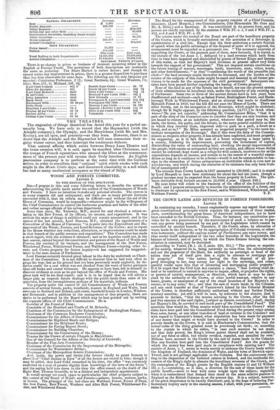THE CROWN LANDS AND REVENUES IN FOREIGN POSSESSIONS. LETTER IL
In continuing my remarks, I must emphatically express my regret that many great constitutional principles which regulate the government of these realms, seem, notwithstanding the great lesson of American independence, not to have been extended to the British Colonies. Thus, for instance, our constitution pro- vides for its own preservation by the maintenance of such a balance as to pre- vent any power being possessed by one part of the Legislature which cannot be controlled by another branch. Therefore, if the Crown alone, by alienation of waste lands in the Colonies, or by its appropriation of Colonial revenues, or other- wise howsoever, without the express assent of Parliament, can raise money, and thus render itself independent of the two other branches of the Legislature, the balance of interest, and of power, by which the Three Estates forming the con- stitution is cemented, may be destroyed. According to Vette], (B. i. ch. 2, sects. 260, 261,) "The prince or superior of the society, whatever he is, being naturally no more than the administrator, and not the proprietor of the State, his authority as sovereign or head of the nation does not of itself give him a right to alienate or mortgage pub- lic property." But "the nation having the free disposal of all pro- perty belonging to her, may convey her right to the sovereign, and conse- quently confer upon him that of alienating and mortgaging public property." If it be urged that the Civil Lid Act contains a clause, "that nothing shall ex- tend or be construed to extend in anywise to impair, affect, or prejudice the rights, or powers of control, management, or direction, which have or may be exer- cised by the authority of the Crown, or other lawful warrant, relative to any leases, grants, or assurances of any of the small branches of her Majesty's re- venues, or to any snits," &c.; and that the sale of waste lands in the Colonies, and any such transfer as that of Vancouver's Island by the Colonial Minister of the Crown, is therefore sufficiently authorized without any further Parlia- mentary sanction; yet still it will be seen, by reference to the statute, that it proceeds to declare, "that the monies accruing to the Crown, after the full and free exercise of the said rights, (subject as therein mentioned,) shall, during her Majesty's life, be carried to and made part of the Consolidated Fund." The questions then would be, What monies would have accrued to the Crown? what sums have been paid into the Consolidated Fund during the present reign arising from sales, leases, or any other transfers of land or revenue in the Colonies? and with regard to Vancouver's Island, what stipulation has been made for payment of any money that might or would have accrued to the Crown? In order to prevent deceits on the Crown, it is said in Blackstone's Commentaries, that the actual value of the thing granted must be previously set forth; or, according to the statute to which he refers, "in case such mention be not made, and that duly proved, the King's letters patent thereof shall not be available, nor of any force or effect, but wholly revolted, repealed, and annulled for ever." Millions have accrued to the Crown by the sale of waste lands in the Colonies. Has any fraction been paid into the Consolidated Fund? Are the grants for which the money has been paid made in compliance with existing law? The statute of Anne, c. 7, seems in words merely to embrace the Crown lands within the kingdom of England, the dominion of Wales, and the town of Berwick-upon- Tweed, and is not perhaps applicable to the Colonies. But the controversy rela- ting to the disposition of the forfeited estates in Ireland, and the incidental dis- cussion of the King's right to alienate the hereditary revenues of the Crown, and the resumption of the King's grants by the English statute 11 and 12 William III. c. 2,—containing, as it does, a direction for the sale of those lands for the public benefit,—seem to bear with some weight upon the subject; especially when it is remembered that Ireland then stood in the same relative position to England as the British Colonies do at the present day. It is a subject, however, of too great importance to be hastily dismissed; and, in the hope of inducing Par- liamentary inquiry early in the ensuing session, I shall, with your permission, re- sume


























 Previous page
Previous page